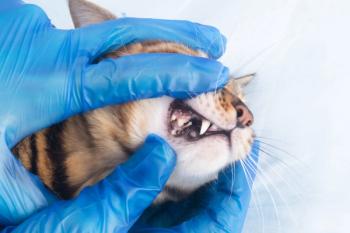
Feline model chosen for MU's genome project
Jefferson City, Mo. — A cat at the University of Missouri (MU) has been chosen to be the genetic model for all cats in the feline genome project.
Jefferson City, Mo. — A cat at the University of Missouri (MU) has been chosen to be the genetic model for all cats in the feline genome project.
Dr. Kristina Narfstrom, of the University of Missouri, is spearheading a nine-month project to map the genetic structure of the feline.
The cat's blood will be used to map the feline genetic structure, allowing for each gene's function to be studied. The process has begun and is expected to take a minimum of nine months for the first steps in the mapping to take place, says Kristina Narfstrom, DVM, PhD, endowed professor MU's veterinary school.
Narfstrom's title as the Ruth M. Kraeuchi Missouri Professorship of Veterinary Ophthalmology and years of collaborated work with the National Cancer Institute put her at the top of the list when The National Human Genome Research Institute, part of the National Institutes of Health was looking for an outlet for a feline with pure heritage.
Daily News Updates
Narfstrom has been breeding Abyssinian cats for more than 30 years and is currently using the selected cat in her work at the university.
"Many will benefit with the mapping, animals and human medicine," Narfstrom says.
Scientists will be able to determine which gene causes diseases in cats, including blindness and cancer, authorities say.
The goal is to create treatments for such genetic abnormalities.
An improved understanding of virus-mediated diseases that could lead to more effective vaccines is an expected result after the gene mapping is completed.
dvm Newsbreak
"It is very important to complete the genetic mapping is cats," Narfstrom says. "Felines are an excellent model in comparative research. After the mapping is complete, the cat can be used in research more effectively," Narfstrom adds.
Retinitis Pigmentosa (RP) one of the hereditary diseases Narfstrom studies may be caused by a mutation in one of 50 different genes and affects cats and humans. There is currently no cure for the disease that eventually causes blindness. Narfstrom remains hopeful that treatment for the disease will come from the mapping.
Newsletter
From exam room tips to practice management insights, get trusted veterinary news delivered straight to your inbox—subscribe to dvm360.



